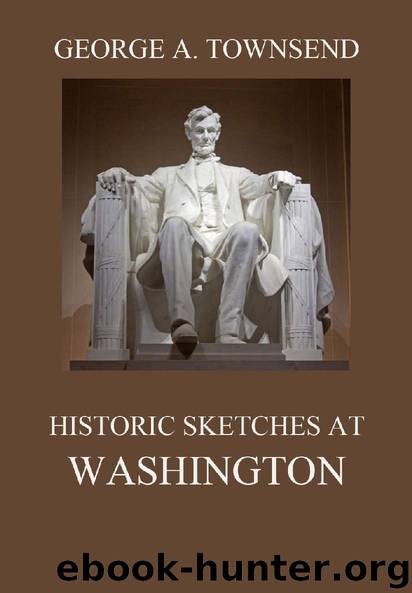Historic Sketches At Washington by George Alfred Townsend

Author:George Alfred Townsend [Townsend, George Alfred]
Language: eng
Format: epub
Tags: Geschichte
Publisher: Jazzybee Verlag
Published: 2019-05-19T22:00:00+00:00
Freneau, the Madisonian editor, was the abler of the two, and, from the beginning, the outside aggressive journalism of the country has been more influential and better sustained than the pap-journalism. Freneau finally provoked Hamilton, in the third year of Washington's administration, to reply to him anonymously, saying truly that to be a government clerk and edit a political paper was "indelicate, unfit, and inconsistent with republican purity." Freneau published an affidavit denying that Jefferson ever gave a cent or wrote a line for his paper. This was the first newspaper war under the republic; Washington interfered in it. Freneau's official salary was $250 a year; he modelled and took much of his news from the Leyden (Holland) Gazette. Jefferson is said to have always affected unconcern in newspapers. Hamilton began public life as a newspaper contributor, and he instigated the earliest personal journalism under the government. Jefferson, however, alleged that Freneau had saved the Republic from being monarchized. Freneau's field was soon competed for by Bache, Franklin's grandson, in the Advertiser, afterward the Aurora, and the Jeffersonian press wrote compactly and in unison over all the country. Then Madison, under the name of "Helvidius," attacked Hamilton, who wrote under the name of " Pacificus." Washington wrote that the "publications in Freneau's and Bache's papers were outrages on decency;" nevertheless, Freneau sent him three copies gratis every day.
The administration of Washington closed gloomily, and Dr. Michael Leib, afterward Congressman and Senator, wrote in the Aurora, the day the President retired to peace, an article upon the corruptions of the Administration, that a ship contractor cudgeled him for. When Adams came in, almost the whole press was Jeffersonian, and Freneau and Bache had completely exhausted Hamilton with his own favorite weapon, the pen. Hamilton was pursued still further; in 1797, Thomas Callender, a pamphleteer, whose descendants are said to be still booksellers in Philadelphia, exposed Hamilton's liaison with a Mrs. Reynolds, and many indecent letters were published.
The defeated Hamiltonians patronized William Cobbett and his Porcupine's Gazette, the eighth daily paper published in Philadelphia eighty-three years ago, more than in all the country. Cobbett was then an English Tory, and he did the Federalists more harm than good. He got into collisions with Noah Webster, then a New York editor. In 1797 he was put under bonds for libeling the Spanish Minister. Matthew Carey was also a Jeffersonian editor at that time. Callender was always getting on a drunk, and Cobbett was always getting into court; so John Adams' party resolved upon a sedition law to break up the anti-Federalist press. By opposition the journals thrived and grew steadily bolder.
The Aurora accomplished the first newspaper "beat," by printing Talleyrand's dispatches against the partiality of the Adams administration before the government got them. This led to a deep jealousy against the newspapers, as dangerous malcontents and usurpers of government authority.
In 1798, the "Party," otherwise the administration, and the press came to a colossal trial of strength. James Lloyd, of Maryland, presented the Sedition Bill, especially aimed at Add the Aurora newspaper.
Download
This site does not store any files on its server. We only index and link to content provided by other sites. Please contact the content providers to delete copyright contents if any and email us, we'll remove relevant links or contents immediately.
| Africa | Americas |
| Arctic & Antarctica | Asia |
| Australia & Oceania | Europe |
| Middle East | Russia |
| United States | World |
| Ancient Civilizations | Military |
| Historical Study & Educational Resources |
Cat's cradle by Kurt Vonnegut(15359)
Pimp by Iceberg Slim(14508)
4 3 2 1: A Novel by Paul Auster(12393)
Underground: A Human History of the Worlds Beneath Our Feet by Will Hunt(12099)
The Radium Girls by Kate Moore(12030)
Wiseguy by Nicholas Pileggi(5787)
The Fire Next Time by James Baldwin(5447)
Perfect Rhythm by Jae(5404)
American History Stories, Volume III (Yesterday's Classics) by Pratt Mara L(5308)
Paper Towns by Green John(5191)
Pale Blue Dot by Carl Sagan(5010)
A Higher Loyalty: Truth, Lies, and Leadership by James Comey(4964)
The Mayflower and the Pilgrims' New World by Nathaniel Philbrick(4504)
The Doomsday Machine by Daniel Ellsberg(4490)
Killers of the Flower Moon: The Osage Murders and the Birth of the FBI by David Grann(4448)
The Sympathizer by Viet Thanh Nguyen(4393)
Too Much and Not the Mood by Durga Chew-Bose(4348)
The Borden Murders by Sarah Miller(4325)
Sticky Fingers by Joe Hagan(4202)
